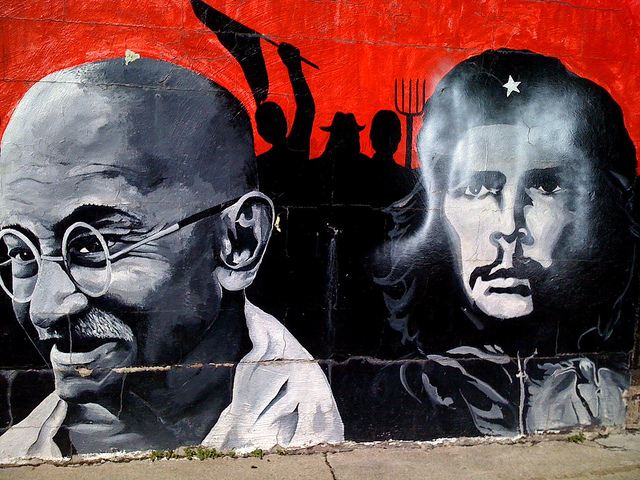
A small nonprofit teaching the art of nonviolent strategy and that is responsible for the overthrow of several dictators, might close doors this month due to a lack of funding.
Over the course of the last century, nonviolent strategy has been turned to a science and used to take down dictator-after-dictator. The Albert Einstein Institution in Boston—and its founder, Gene Sharp, who is now 88 years old and has been repeatedly nominated for the Nobel Prize—has helped make this a reality.
Inspirational leaders like Gandhi and Martin Luther King Jr. have shown us how to use nonviolence effectively. But quietly in the background, Sharp systematized and deepened their methods with astounding results. Nonviolent strategy has helped bring down dictators and defeat foreign invasions in Lithuania, Latvia, Estonia, Serbia, Ukraine and Georgia—and those same methods have been used to train movement leaders in dozens of other countries.
It is sad and ironic that while Americans were willing to spend trillions of dollars in the feckless attempt to make-over Iraq into a democracy, we have been unwilling to spend a tiny fraction of that—a few-hundred-thousand dollars a year—to sustain this astoundingly successful democracy incubator. With only a handful of nonviolent strategy institutes in the world and few scholars working on the issue, the loss of the Einstein Institution would be a tragedy.
According to a massive study of social movements over the course of the last century, carried out by Erica Chenoweth and Maria Stephan at Denver University, nonviolent movements have been twice as effective as violent movements at accomplishing their stated goals. They involve an average of four times the participants and are far more likely to result in stable democracies.
The democratic revolutions of the late 20th century were largely silent, with mainstream and alternative news sources alike saying little when dictators were voted out of office in, say, Africa or Latin America. We have gone from a world in which democracy was the exception to one in which it is the norm, with 86 states now listed by Freedom House as “fully free.” But few have taken notice.
And yet, democracy may be threatened in the 21st century, and with it many of the freedoms we in America take for granted. The number of democracies in the world has been declining for the first time in generations, according to Freedom House, as dictators have learned to counter the methods of nonviolent resistors.
Most people, upon first hearing of nonviolent strategy, think it is merely about protesting. But the Einstein Institute has identified an arsenal of 198 different “nonviolent weapons.” These include stay-at-home days, social boycotts, withdrawing allegiance and strikes; withholding rents, withdrawing bank-deposits, refusing to pay debts and blacklisting traders; sit-downs, slowdowns, mutinies and judicial noncompliance; and this is but a small smattering. The list is so large because virtually any change in behavior that results in withdrawing support from a regime can help to bring it down.
However, the heart of nonviolent strategy is not about tactics, but the deeper strategy of winning over key institutions.
Consider how Americans might respond to a President Trump declaring martial law amid a wave of ISIS terrorist attacks, inspired and enabled by his dysfunctional administration. Protest leaders might begin by securing the allegiance of the military, honoring those officers who refused to carry out his unconstitutional orders. They might seek to bring together church leaders, from left and right, to call on parishioners to withdraw support from the regime. They might organize state governments within the U.S. to ignore Trump’s pronouncements, the news media to refuse to cover them. Allies might declare him liable to arrest were he to travel to their countries, consumers might boycott businesses that support him.
The only problem is that there is no other organization in the country like the Einstein Institute, systematically training movement leaders in nonviolent strategy. And dictators have been developing their own playbook, leading the Einstein Institute to talk about an arms race between dictators and nonviolent activists. Dictators have learned how to fake elections and demonstrators how to expose them; dictators have learned how to disrupt protests without using lethal force, protesters how to better hold their ground. It is a game of swords and shields, with each one side developing better weapons, the other better defenses.
And there is no guarantee the protesters will win, no guarantee freedom will be preserved for future generations. We simply cannot tell which underpinnings of democracy will be worn away under unforeseen social strains. Freedom of speech, freedom to organize; the right to vote, the right to strike; the ability to choose leaders, the freedom to remove them at will: none of this is guaranteed. All of it must be fought for anew with each generation. And too few people comprehend just how to do it—thus, it is imperative that organizations like the Einstein Institute remain standing, and not only remain standing but grow in strength and numbers, and lead us in marching into a freer and fairer future.
Please see their crowdfunding campaign if you would like to contribute.
Author: Theo Horesh
Image: Holly Penny/Flickr
Editors: Emily Bartran; Yoli Ramazzina






Read 1 comment and reply